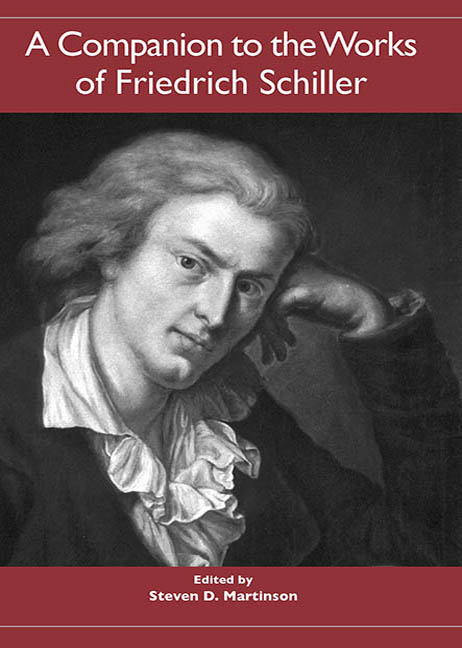Book contents
- Frontmatter
- Dedication
- Contents
- Acknowledgments
- The Works of Friedrich Schiller
- Editions and Abbreviations
- Introduction: Schiller and the New Century
- Intellectual-Historical Settings
- Major Writings
- Die Räuber: Structure, Models, and an Emblem
- Kabale und Liebe Reconsidered
- Great Emotions — Great Criminals?: Schiller's Don Carlos
- Concerning Aesthetic Education
- “On the Shores of Philosophy”: Schiller's Lyric Poetry, 1795
- Wallenstein
- Maria Stuart: Physiology and Politics
- Die Jungfrau von Orleans
- Wilhelm Tell
- Schiller's Legacy
- Works Cited
- Notes on the Contributors
- Index
“On the Shores of Philosophy”: Schiller's Lyric Poetry, 1795
from Major Writings
Published online by Cambridge University Press: 28 April 2017
- Frontmatter
- Dedication
- Contents
- Acknowledgments
- The Works of Friedrich Schiller
- Editions and Abbreviations
- Introduction: Schiller and the New Century
- Intellectual-Historical Settings
- Major Writings
- Die Räuber: Structure, Models, and an Emblem
- Kabale und Liebe Reconsidered
- Great Emotions — Great Criminals?: Schiller's Don Carlos
- Concerning Aesthetic Education
- “On the Shores of Philosophy”: Schiller's Lyric Poetry, 1795
- Wallenstein
- Maria Stuart: Physiology and Politics
- Die Jungfrau von Orleans
- Wilhelm Tell
- Schiller's Legacy
- Works Cited
- Notes on the Contributors
- Index
Summary
Schiller's inclination toward history was already strong during his study of medicine at the Karlsschule in Stuttgart. Plutarch's influential work Vitae Parallelae (Parallel Lives) was especially interesting to him — as if he could one day be a part of these lives. Most of his dramas deal with the great figures of world history and their momentous achievements — as if they were prime examples of a (mostly fatal) greatness that could be elevated poetically. Schiller's historical interest stemmed, to a large degree, from his own strong desire to become great.
While working on his dramas Fiesko and Don Karlos, Schiller studied the historical sources carefully. They served as a collection of facts that he could use however he pleased. On December 10, 1788, he wrote the following to Caroline von Beulwitz: “Die Geschichte ist überhaupt nur ein Magazin für meine Phantasie, und die Gegenstände müssen sich gefallen laßen, was sie unter meinen Händen werden.” In that year he had already published his first great historical work, Geschichte des Abfalls der Vereinigten Niederlande von der Spanischen Regierung (History of the Revolt of the Spanish Netherlands, 1788). At that time, and in order to relax, Schiller shook off the “school dust” of history and leaped “into the realm of poetry” (see his letter to Christian Körner of March 17, 1788). In the poem “Die Götter Griechenlandes” (The Gods of Greece, 1788), he glorified the history of the ancients. In “Die Künstler” (The Artists, 1789), he tied human progress to the historical development of the arts. Moreover, on December 9, 1788, Goethe recommended to the Weimar Secret Council that Schiller be appointed to the University of Jena precisely because of his abilities as a writer of history.
Schiller was named professor in the summer semester of 1789. On May 26, 1789, in his introductory lecture, “Was heißt und zu welchem Ende studiert man Universalgeschichte?” (What is, and to What End Does One Study Universal History?), he tried to convey to his audience that a collector and presenter of historical facts is not a historian but at most a “bread-scholar” (“Brotgelehrter”). Only as a philosophical thinker (“philosophischer Kopf”), who is capable of closing the gaps that tradition creates by means of his imagination and reasoning, will the historian accomplish a true — and teleological — understanding of history.
- Type
- Chapter
- Information
- A Companion to the Works of Friedrich Schiller , pp. 169 - 188Publisher: Boydell & BrewerPrint publication year: 2005

